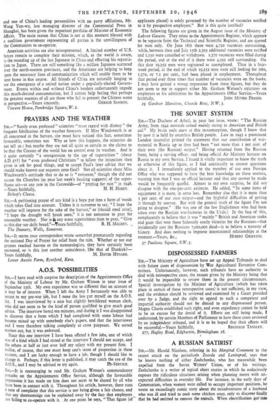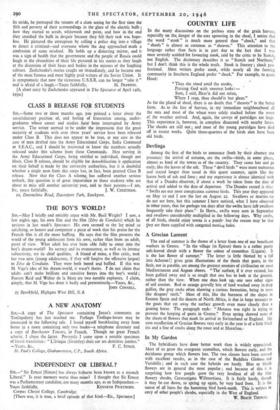A RUSSIAN SATIRIST
Sm,—Mr. Harold Nicolson, referring in his Marginal Comment to the recent attack on the periodicals Zvesda and Leningrad, says that he knows nothing of either Zoshchenko, who has meanwhile been expelled from the Soviet Writers' Union, or of his writings. Zoshchenko is a writer of topical short stories in which he audaciously exposes the ridiculous situations arising when planning meets with un- expected difficulties in everyday life. For instance, in the early days of Communism, when women were called to occupy important positions, he wrote an exceedingly comic story about the misadventures of a husband who was ill and tried to cook some chicken soup, only to discover finally that he had omitted to remove the entrails. When electrification got into its stride, he portrayed the tenants of-a slum seeing for the first time the filth and poverty of their surroundings in the glare of the electric bulb ; how they started to scrub, whitewash and paint, and how in the end they smashed the bulb in despair because they felt their task was hope- less. He pictured the corruption by calling a police dog into a village to detect a criminal—and everyone whom the dog approached made a confession of some misdeed. He holds up a distorting mirror, and it was a sign of health that the government and the people of Russia could laugh at the absurdities of .their life pictured in his stories as they laugh at the distortion of their faces and bodies in the mirrors of the laughing cabinet. Zoshchenko's stories caught on immediately, and he became one of the most famous and most highly paid writers of the Soviet Union. It is symptomatic that now the victorious U.S.S.R. can no longer "take it"
and is afraid of a laugh.—Yours faithfully, M. PRAWDIN. [A short story by Zoshchenko appeared in The Spectator of April 14th, 1939-1



























 Previous page
Previous page